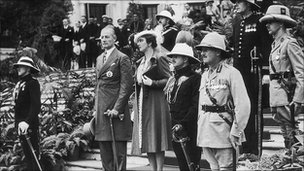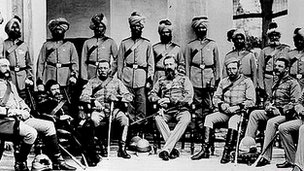|
3 November 2010
By Mark Dummett BBC News, Delhi

The recordings were made to teach British colonial
officers serving in India the local languages
A collection of Indian sound recordings from the early 20th Century,
which has never been made public before, has been put online and
is available to download free.
The recordings were made by British colonial officers
as part of a massive effort to study hundreds of different languages
and dialects spoken in Britain's Indian Empire, which in those
days stretched from the frontier with Afghanistan all the way
into Burma.
The gramophone records were only recently tracked
down, gathering dust in the British Library, by Professor Shahid
Amin of Delhi University.
"This is a unique collection and that it has gone online
is a thing to be celebrated," he told the BBC.
"We didn't just want to put the recordings
on to CDs and then leave them in a research centre," he said.
"The people who really know these languages might be living
in a village. They too can go to a cyber cafe and listen to these
voices from the past." Almost 250 gramophone records in all
have been digitised and put on to the website
of the Digital South Asia Library,
which is run by the University of Chicago and the Centre for Research
Libraries.
They contain songs and stories in 97 different languages
and dialects compiled between 1913 and 1929. Recording them all
was a mammoth project, which involved a single gramophone operator
criss-crossing the subcontinent. His cut-glass English accent
can be heard introducing each new narrator and singer, who themselves
sometimes had to travel hundreds of kilometres. The archive includes
the only known recording of a famous "dastango", or
storyteller of Delhi, Bakr Ali, whose stories normally lasted
for hours, rather than the three and half minutes that could be
put on to a gramophone record.
The Indian government hoped that the sound archive, complemented
by 19 volumes of text, could be used to teach trainee civil servants
from Britain the language of the region in which they were about
to serve.

Britain's Indian Empire included hundreds of languages
and dialects. To help the British compare the different languages,
a single, standard text was also translated and its narration
recorded. The project was known as the Linguistic Survey of India.
The man behind it, George Grierson, chose the Biblical passage
The Parable of the Prodigal Son to be this text.
Prof Amin says that perhaps this was not very appropriate
for a country with relatively few Christians.
"Grierson really coyly remarks in a footnote that this was
the best thing because here you have all the three tenses, past,
present and future and all the three persons in a relatively short
story," Prof Amin said.
"That was fine for a grammatical exercise.
The real problem was that not everyone knew the story." Prof
Amin describes Grierson as a "linguistic genius" who
dedicated decades of his life to this project. But after his retirement
from the Indian Civil Service the recordings disappeared into
obscurity - until now.
http://www.bbc.co.uk/news/world-south-asia-11677932
|